A Psychoanalytic Perspective of Living as a Couple
Is it necessary to live as a couple?
To answer this question, it is useful to ask what basic needs the couple’s relationship resolves. There are two such needs that the couple aims to fulfil:
1. Actualization of Sexuality: The powerful sexual instinct ensures the continuity of the species, in our case, the human race.
2. Defense Against Isolation: Here it is essential to distinguish between loneliness and isolation. We can provisionally define loneliness as the temporary absence of the social network we are involved in. Isolation, on the other hand, is understood as the experience of not being in anyone’s mind, of not occupying a prominent place in anyone’s relational universe.

Why is the feeling of isolation so severe?
When a baby is born, as it begins to distinguish between self and non-self, it perceives itself as an alarmingly isolated, exposed organism. Only the presence of another who provides the nourishment and embrace rescues it from this experience, imprinting on the subject’s bodily memory the sensation that “I do not exist when I do not exist for another.” Of course, there are various resources to overcome isolation, such as friendships, family, corporations, communities, or any other form of grouping, but here we focus on those who choose a couple as the solution.
Cindy Hazan, a psychologist specializing in attachment psychology, argues that: “Human beings are biologically programmed to fall in love for 18 to 30 months,” based on research involving 5,000 people from different cultures. She concludes that love has a “lifespan,” long enough for the couple to meet, copulate, and have a child. Hazan also found that when passion wanes, the brain begins to produce certain types of endorphins that give rise to other emotions, such as companionship, affection, and the need to share experiences with the other, entering what she calls the “mature love” stage.
“Love does not consist in gazing at each other, but in looking outward together in the same direction.” – Antoine de Saint-Exupéry.
Love does not complete anyone. Love gives us the illusion of being a bit more complete because it gives the impression that when we are in love, loneliness hurts less, and when love is good, this occurs. If we demand that our partner complete us, we are condemning the relationship to failure.
Talking About Couples
How do couples talk? Do functional and dysfunctional couples talk in the same way? Here, we outline some differences: the talk of love to the other, conflict with the other, and knowledge of the other.
In the talk of love: Old words sound new to the ears of the listener: “I love you. I desire you. I miss you. I seek you.” These may be old words, but they sound new to the listener. These words are heard with delight and responded to with similar words that induce pleasure. The repetition of the cycle intensifies the bond.
In the talk of conflict: Old words are renewed in repeated demands, constant complaints, or spite. The response is defence and attack, blocking any positive progress. This sometimes leads to verbal or physical violence.
In true dialogue, questioning by one partner, based more on a confessed personal need rather than an accusatory claim, is met with a response that implies a novel alternative. This dialogue inaugurates new understandings and leads to greater knowledge of the other while also enhancing self-knowledge. When couples do not spontaneously and gradually access this dialogue, they may require the help of a therapist whose mission is to reinstall this type of dialogic change. Finding love can be a delightful discovery, but sustaining it over time is a delicate task.
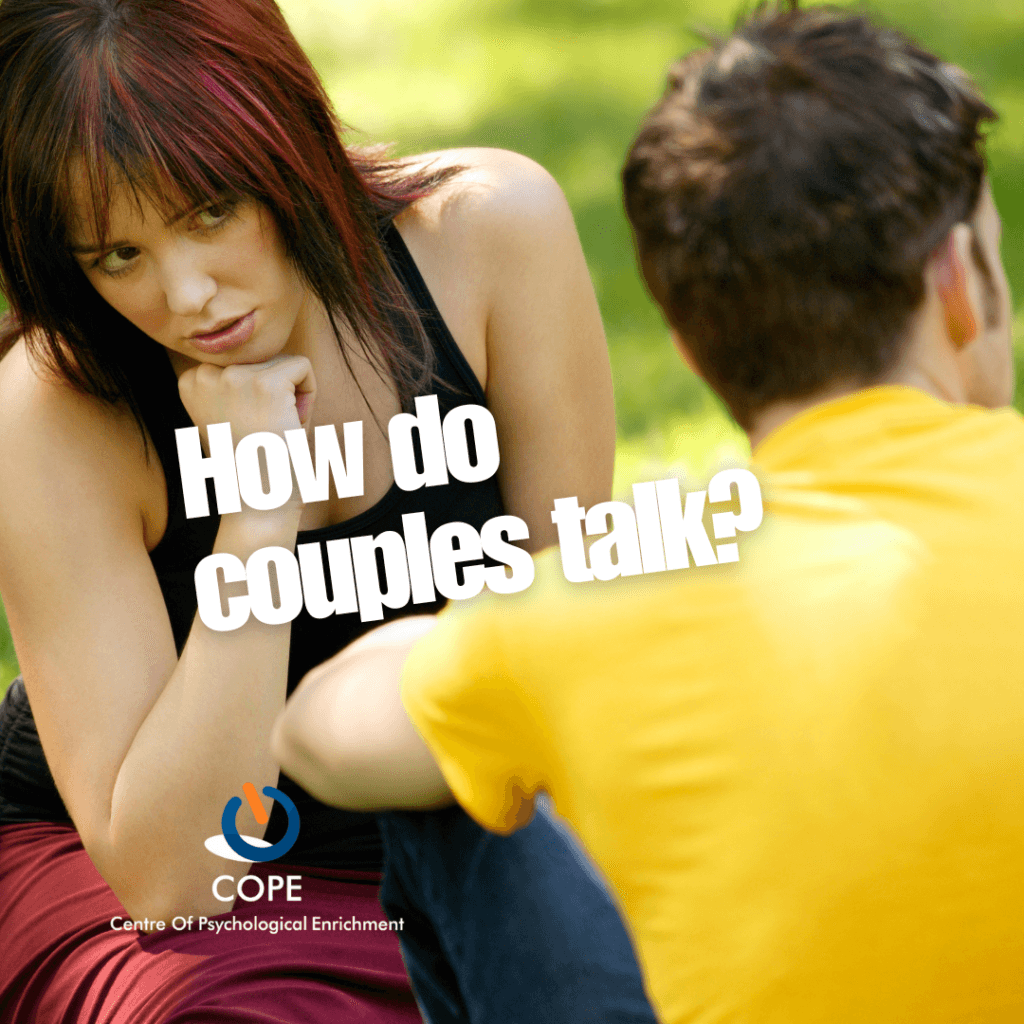
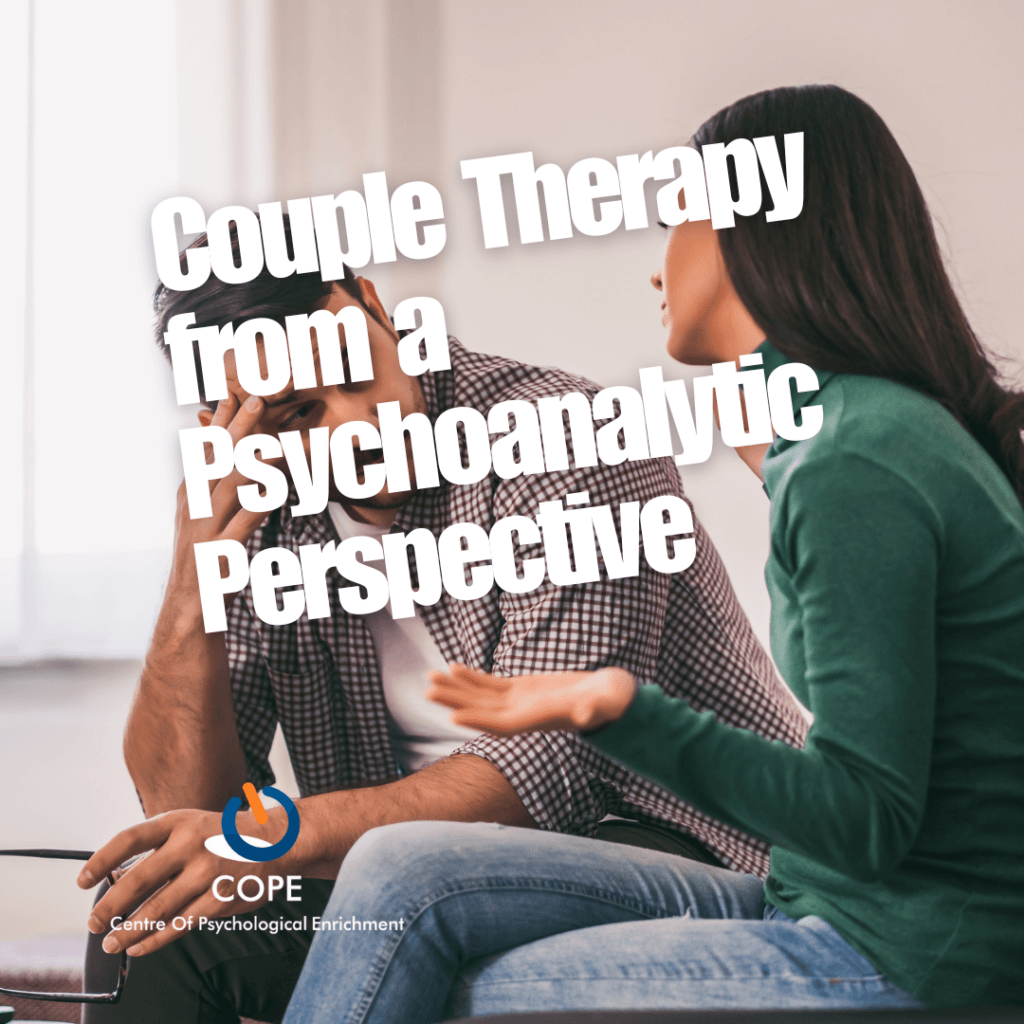
Couple Therapy from a Psychoanalytic Perspective
Couple therapy does not mean getting clients to live according to how the therapist thinks they should live but simply modifying those behaviour patterns, supported by the redundant discourses circulating between them, that causes suffering.
When we delve into our clients’ histories, among other things, we trace those ORIGINAL COMMUNICATIVE RELATIONAL PATTERNS (relationship with parents) and their relationship with CURRENT COMMUNICATIVE RELATIONAL PATTERNS (partner) and how both needs are articulated in the couple.
How do two previously unknown individuals come to form a couple?
We choose a partner for things the other has that we long for (deficiencies) and for things the other possesses similar to what we have (affinities). But these motivations are not mutually exclusive; they articulate together. When both need to call to us with similar force, the choice is likely fortunate. But when deficiencies or affinities predominantly drive us, conflict is probable. If deficiency determines our choice, we will demand more from the partner than they can give, and if affinity predominates, any difference will be evaluated as a deception.
The couple is seen as an interactive system, and therapy is based on understanding this system of mutual influence and regulation. In it, psychic functioning is constituted by the intrasubjective (psychic determinants from the inner world) and the intersubjective (psychic determinants that include the other). Couple therapy has important advantages and facilitates changes, offering an opportunity to rework unconscious alliances and unresolved dilemmas in both families of origin of the members of the dyad, unconscious issues stemming from generational and transgenerational transmission.
From Mayra Brufau
References:
Aznar-Martínez, B., Pérez-Testor, C., Davins, M., & Aramburu, I. (2016). Couple psychoanalytic psychotherapy as the treatment of choice: indications, challenges, and benefits. Psychoanalytic Psychology, 33(1), 1-20.
“Bases of Adult Attachment: Linking Brain, Mind and Behavior”* – Co-edited with Vivian Zayas, this book explores the formation and maintenance of adult attachment, discussing the psychological and neurological underpinnings (Springer, 2013).
COPE Centre of Psychological Enrichment
Visit us at 2 Lawrence Avenue, West Perth
📞 (08) 6556 6460
📧 [email protected]
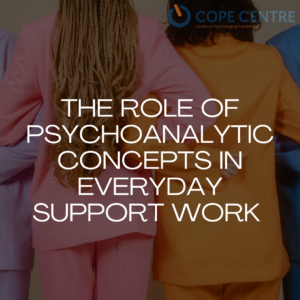
14 May 2025
No Comments
Read More »
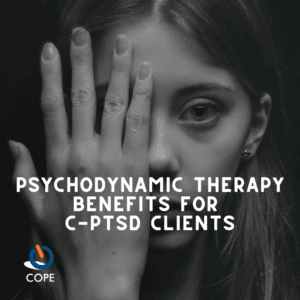
5 March 2025
No Comments
Read More »
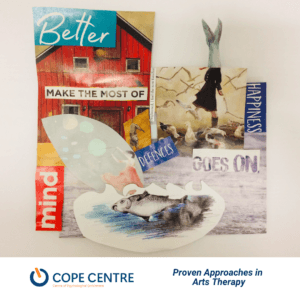
5 March 2025
No Comments
Read More »